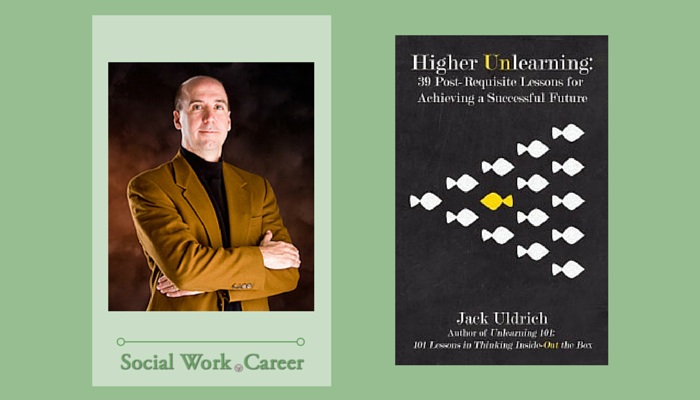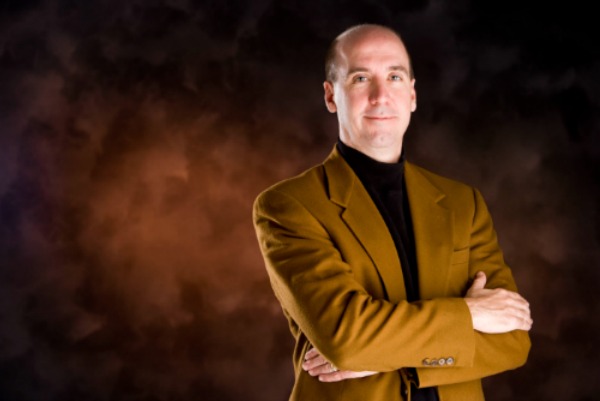Have you heard about the concept of unlearning?
According to Jack Uldrich, unlearning is a crucial skill to develop as part of the process of acquiring knowledge because some types of learning cannot occur until some unlearning has first taken place.
In Jack’s latest book, Higher Unlearning: 39 Post-Requisite Lessons for Achieving a Successful Future (affiliate link), he defines unlearning as:
1. the act of releasing old knowledge
2. to see the world not as one would like to see it, but as it really is
3. to be un-uninformed
4. to acquire wisdom either by replacing old information that has been supplanted by new knowledge, or alternatively, by relinquishing known falsehoods
With scientific and technical knowledge doubling every 7 years, unlearning is essentially a survival skill in today’s rapidly changing world.
To underscore this point, Jack provides the analogy of how a modest unseen iceberg led to the downfall of the “unsinkable” Titanic and how there is the danger of future unknown “icebergs”(as in biotechnology, robotics, quantum physics, etc.) that may destroy the most “unsinkable” of industries.
However, he argues that leaders and organizations which possess the unlearning skill (and ability to change course quickly and often) are likely to be able to safely charter through the unknown waters.
Unlearning is a difficult skill to acquire. To help you get started down the path of unlearning, Jack provides in his book 39 lessons (one lesson per chapter). He also offers a homework exercise at the end of each lesson to allow you an opportunity to apply the lesson you just unlearned.
I enjoyed my first read but must confess that I didn’t have the patience to actually do most of the prescribed homework exercises this time around. My plan is to re-read the book at a slower pace and then take the time to do them. I don’t think you can fully absorb the unlearning component if you skip them.
Some examples of the lessons to learn (or unlearn) include:
- Cast a Narrow Net
- See What Isn’t There
- Zone Out to Zone In
- Don’t Reach for the Stars
- Stop Looking for Patterns
As you might expect, engaging in these lessons will not only open you up to new learnings but increase your capacity to be more creative and innovative. In the process of unlearning, you start to question some of your assumptions, the beliefs or pieces of knowledge you just assumed to be true because they were once true…
And now, I’d like to introduce you to the author, Jack Uldrich, who is also a renowned global futurist, independent scholar and business speaker. Jack is also known as @ChiefUnlearner on twitter and you may find him at his School of Unlearning site.
So without further ado, Jack, how did you become a global futurist and business innovator?
After college, I served as a naval intelligence officer and, later following graduate school, I returned to the Pentagon as a policy analyst and strategic planner. I then left federal government to become the director of the Office of Strategic Planning for the State of Minnesota. In this capacity, I began studying emerging technologies.
What I soon discovered is that while the scientists and researchers working on these new technologies are incredibly bright, they aren’t so effective at explaining (in practical terms) what their science means to the average person. This insight lead me to a career as an author and futurist. I like to think of myself as a kind of “technology interpreter.”
How do you keep up with all the changes that are occurring in the different areas? What are some of the techniques you use to make projections about what our future may hold?
I read a great deal–blogs, articles and books. Two of my favorite resources are MIT’s Technology Review and the website, www.physorg.com. Both do an excellent job of staying abreast of emerging technologies.
I also use various social networking tools to stay in touch with other people who are scouring the Internet for insights about the future. These individuals act as a filter of important news for me.
When/what made you realize the significance of unlearning?
I wish I could say I realized the significance of unlearning years ago but, really, it only occurred to me within the last five years. Years ago, the renowned futurist Alvin Toffler wrote, “The illiterate of the future won’t be those who can’t read or write, they’ll be those who can’t learn, unlearn and relearn.”
The more I reviewed my own life and the more I worked with clients, the more I realized that most individuals don’t have much trouble learning or relearning. They do, however, have significant issues with unlearning. I think this is because once a person has vested him or herself in the existing knowledge, it can be a difficult and painful thing to acknowledge what one once thought to be true is no longer so.
Do you have any predictions as to where the mental health field may be 50 or 75 years from now?
I certainly can’t–and won’t–claim to have much knowledge about the field of mental health but I think it is important to always be aware of we don’t yet know. For example, in the field of neuroscience, 95% of what we now know has been discovered in the past 20 years. This sounds impressive and indeed, it is; but it’s worth noting that the pace of discovery isn’t slowing down.
This means, in the future, we will know even more about the role the brain plays in mental health. Is it possible that some of this new knowledge will render our existing knowledge obsolete? From my perspective, it is not only likely; it is inevitable. The question then becomes will mental health experts stay open to the idea of constantly revisiting their assumptions?
How do you see the concept of unlearning being interpreted within the world of mental health?
I would hope the concept of unlearning would be welcome with open arms in the mental health community. Unfortunately, as someone far wiser than me once said, “Every mile you go in the wrong direction is actually a two-mile error. Unlearning is harder than learning.”
My point is that no one–myself included–enjoys unlearning because it requires us to set aside knowledge that we spent a great deal of effort acquiring. But, if we want to constantly improve, it is a skill which we must all be open to and strive to become better at.
You suggest that we create an anti-resume as one of your homework assignments. Can you expand on that idea?
The idea of creating an “anti-resume”–a list of knowledge or skills that you don’t possess–can be a powerful exercise because it will force you to acknowledge how little any of us actually knows. Embracing one’s ignorance is a difficult and humbling idea, yet once you do, you are more likely to acknowledge the possibility that you will always need to be unlearning.
Counter-intuitively, an anti-resume can also make you more intellectually curious and open-minded. And, in today’s ever accelerating and changing world, these are skills that will always be in demand.
Thanks so much, Jack, for providing us with this fascinating glimpse of unlearning and how it may apply within the mental health field!
What are your comments and/or thoughts regarding the process of unlearning? Do you agree that this is an important skill to develop?
Disclosure of Material Connection: I received one copy of the book mentioned above for free in the hope that I would mention it on my blog. Regardless, I only recommend products or services I use personally and believe will be good for my readers. I am disclosing this in accordance with the Federal Trade Commission’s 16 CFR, Part 255: “Guides Concerning the Use of Endorsements and Testimonials in Advertising.”




Dorlee – It’s great to see this post on unlearning. In the writing I’ve done on creating a stronger personal innovation perspective, after knowing what you’re creative strengths and weaknesses are, “forgetting” is the first step in moving forward to be more creative. It’s vital to be able to selectively turn on and turn off your knowledge and expertise since they definitely can stand in the way of new thinking.
Thanks, Mike
I’m so glad that you enjoyed this post.
How interesting to hear that you have been engaging in creative “forgetting” to stimulate new thinking.
I’m wondering what types of exercises or things you do to selectively turn off your knowledge…Are these similar to the ones that Jack proposes like creating an anti-resume?
Not to drop links on you, but this one contains a section on being forgetful with some of the exercises I suggest (and use myself): http://brainzooming.com/innovation-perspectives-taking-the-no-out-of-innovation-presentation/9232/
The exercises include identifying and then specifically eliminating conventional wisdom from consideration, deliberately forcing a change in perspective, and using a technique called trait transformation to radically change the characteristics of your current situation.
Based on the titles of lessons you list from the book, I’m guessing some of these exercises are pretty similar in their objectives to the book’s lessons.
Thanks so much, Mike
As one might expect, your exercises are different than the ones that Jack proposes. However, they seem to provide alternative ways at achieving the similar goal of unlearning or forgetting old knowledge.
It is probably good to have many ways of doing this because our natural tendency will be to fall back on old patterns. It takes conscious and deliberate effort to change our typical ways of thinking and seeing things.
Dorlee, thanks for sharing this review and interview.
I think all professions need to invest in ‘unlearning’ given the technological and social revolution we are experiencing.
Mental health has historically resisted change.
But we have lots to unlearn. From accepting evidence-based treatment, to acknowledging that relationships occur online and off, there is much we need to accept and adjust to if we are to remain relevant and effective to the current populations we serve.
Thanks again for bringing this to my attention!
Susan,
Susan, I’m so glad that this topic spoke to you 🙂
I appreciate you interpreting how you envision some of the required unlearning within the mental health field.
Perhaps one of the reasons that there is so much resistance to accepting evidence-based practice is that some necessary unlearning has not occurred with respect to the various modalities.
The prevailing belief has been that any treatment will help a client and that the success of a treatment depends upon the establishment of a strong therapeutic relationship.
However, research has proven this belief to be false…the best treatment is not always what the therapist intuitively feels is the best one to apply and now there are specific evidence-based treatments proving the case to be otherwise.
But until the unlearning has occurred – acceptance that the previous assumption is no longer true, it may be hard for therapists to accept the reality of evidence-based treatments.
Thanks again!
Dorlee,
What a fascinating interview. I think that the idea of unlearning goes hand in hand with the humility of acknowledging that we are always learning and growing. Sometimes what we learn are the things that we need to let go of.
Ann
Ann,
Thanks so much for sharing your feedback and reactions to this interview 🙂
I like your interpretation of looking at unlearning as part of the normal process of learning and growing…